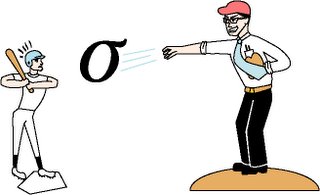Monday, May 29, 2006
Monday, May 22, 2006
Dyscalculia -- numbers made hard
Joke: Why is 6 afraid of 7? Because 7 ate 9! You don't get this? Perhaps you suffer from dyscalculia -- a learning disability that creates severe difficulty in understanding and using functions or symbols needed for success in mathematics. (Or maybe this joke is very stupid!) Like dyslexia, which affects reading ability, dyscalculia can be caused by a visual perceptual deficit. The UK government's Department for Education and Skills includes this numeracy problem in its leaflet on Guidance to support pupils with dsylexia and dyscalculia. What brought this to my mind was hearing someone at my household this weekend complain that the DVD burning process was only "5/3rds" done! Maybe fractions should be put in a special category -- they really are terribly hard to fathom. I thought I had fractions mastered until the time I traveled into the hinterlands of western Wisconsin into a chain of lakes peppered with cabins. The one I wanted was on 178&23/32nd street. It challenged me to calculate that I ought to keep on going past 178&1/2, 178&5/8th and 178&11/16th streets.
Wednesday, May 17, 2006
Statisticians strike out the Minnesota Twins baseball team :(

The May 15 issue of Sports Illustrated magazine passes along a prediction by statisticians that the Minnesota Twins have virtually no hope of winning this season, even though they've only played about one-fifth of the games. The team started the year with a 2 to 1 shot at achieving the playoffs in Major League Baseball, but after their 13-18 start, the odds are now 200 to 1 against this. These probabilities come from a Monte Carlo simulation done by Clay Davenport -- a statistician specializing on baseball, also known as a "sabermetrician". His latest stats can be seen in the Baseball Prospectus Odds Report, which touts that its analyses stem from "Playing the rest of the season a million times." Evidently the Minnesota Twins management read this report because local sports writers have been spreading rumors that the team will divest itself of highly-paid stars Tori Hunter and Shannon Stewart. Due to a rash of injuries, the New York Yankees need outfielders as soon as possible and they have the money and prospects to entice the small market Twins into giving up their season. As a Minnesota fan, I say that these statistics be damned!
Saturday, May 06, 2006
Dreaded statistics
When you are faced with something dreadful, like a final exam in statistics class, do you just want to get it over with as quickly as possible? If so, you are acting irrationally because it makes more sense to delay something unpleasant as long as possible. However, according to a new study in Science magazine reported by Sandra Blakeslee in the New York Times, some people are extreme "dreaders" who prefer more pain if it gets things over with, sooner. The research by Dr. Gregory S. Berns, a professor of psychiatry and behavioral sciences at Emory University, was literally shocking: His team of scientists applied voltage to their subjects' feet at levels and delays of their choosing. Berns found that when it comes to dread the waiting time makes it more intense. That must be what makes a college course on statistics so dreadful -- waiting the whole semester for the final exam! It seems to me that the certainty of something scary like this is also a key. For example, at the moment, the avian flu is creating great dread because it seems likely to become an epidemic and create many deaths. However, if this likelihood abates with time and/or medical preparations advance to a more comforting level, our dread will drop off. Unfortunately, it is hard getting around a final exam!
PS. According to Schachter & McCauley, authors of "When Your Child is Afraid," an adult's most common fears, in order of magnitude, are: public speaking, making mistakes, failure, disapproval, rejection, angry people, being alone, darkness, dentists, injections, hospitals, taking tests, open wounds, blood, police, dogs, spiders, deformed people.
PS. According to Schachter & McCauley, authors of "When Your Child is Afraid," an adult's most common fears, in order of magnitude, are: public speaking, making mistakes, failure, disapproval, rejection, angry people, being alone, darkness, dentists, injections, hospitals, taking tests, open wounds, blood, police, dogs, spiders, deformed people.



